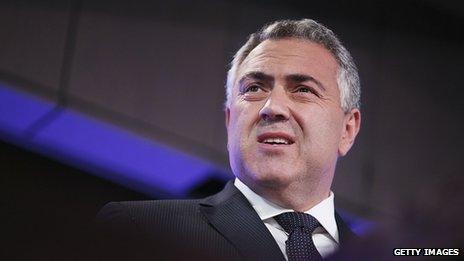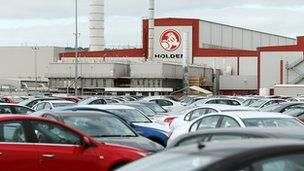Australia: Budget deficit may last a decade
- Published

Australian Treasurer Joe Hockey has warned that the country's fiscal position is "unsustainable"
Australia's budget deficit may last for a decade if urgent "remedial action" is not taken to improve the country's finances, its government has warned.
In its latest economic outlook, the deficit was forecast to rise to 47bn Australian dollars ($42bn; £26bn) in the year to June as a result of a weakening economy.
That compares with a forecast for a A$30bn deficit made in August.
The country's 2014-2015 growth forecast was also downgraded to 2.5% from 3%.
Treasurer Joe Hockey said the economy was undergoing a tough transition and pledged to tighten spending.
"This is an unsustainable fiscal position and the government is committed to taking the hard decisions to live within its means," Mr Hockey said.
"More than half the deterioration in the budget position is due to the softer economy," he said.
"This reflects a sharper-than-forecast fall in resources investment and a slower recovery in the non-resources sectors."
Economic challenges

Australia's Holden Cars, a unit of General Motors, will stop production by 2017
Australia's economy has been lifted by a mining boom over the past decade, driven by China's seemingly insatiable demand for natural resources such as iron ore and coal.
However, that trend has reversed in recent months because of a slowdown in China, Australia's biggest export market, and a weak global economy,
The reduced demand for commodities has pushed prices down, which in turn have hurt Australian mining businesses. Many have had to lay off workers and put projects on hold.
To try to stimulate growth, the Reserve Bank of Australia has cut interest rates to a record low of 2.5%, making it cheaper to borrow money.
But the effectiveness of that has been offset by the strength of the Australian dollar, which has put pressure on manufacturing industries such as carmakers.
Last week, General Motors announced it would stop production of its Holden cars and close its Australian plants by 2017.
The government said it expected challenging times ahead because global economic conditions remained "subdued".
"The Australian economy's growth transition from resources investment to the non-resources sector is also proving slower than expected," Mr Hockey said.
- Published13 December 2013
- Published11 December 2013
- Published4 December 2013